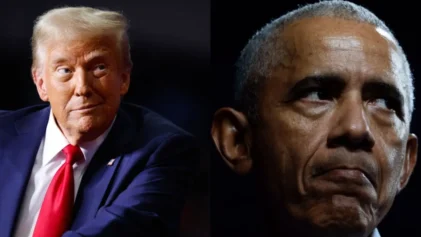The United States and the Obama administration have a mounting public relations and diplomatic nightmare on their hands, as classified documents provided by NSA whistleblower Edward Snowden have revealed that the NSA monitored the phone conversations of 35 unnamed world leaders. The Snowden revelation comes after German Chancellor Angela Merkel angrily accused the U.S. of tapping her mobile phone.
Though U.S. officials have tried to brush off the charges by saying that nations such as the UK and France perform the same type of intelligence gathering, it appears that the anger at the U.S. is picking up steam.
At a rally held in Washington yesterday in front of the Capitol Reflecting Pool organized by Stop Watching Us—a coalition of more than 100 organizations including the American Civil Liberties Union (ACLU), the Electronic Frontier Foundation, the Council on American-Islamic Relations, and Freedom Works—activists demanded changes to stop the government from eavesdropping on all the phone and Internet activity of U.S. citizens. The rally was held on the 12th anniversary of the signing of the Patriot Act.
The activists also called for a special committee to investigate and report domestic spying violations and create regulatory reforms.
In a statement sent from Russia, Snowden described “a system of pervasive surveillance” working against American citizens, and he urged technology and free rights activists to spread awareness of the spying violations in the name of reform.
“Today, no telephone in America makes a call without leaving a record with the NSA. Today, no Internet transaction enters or leaves America without passing through the NSA’s hands. Our representatives in Congress tell us this is not surveillance. They’re wrong,” Snowden said. “Now it’s time for the government to learn from us.”
It was links from Snowden that revealed the NSA had allegedly eavesdropped on cell phone calls by Merkel. Reuters reported that Merkel, who suspected the surveillance after finding her mobile phone number written on a U.Ss document, called President Obama and reportedly called for U.S. surveillance to be placed on a new legal footing.
“The [German] federal government, as a close ally and partner of the US, expects in the future a clear contractual basis for the activity of the services and their co-operation,” she told the president.
Katrin Goring-Eckhart, leader of Germany’s Green party, called the alleged spying an “unprecedented breach of trust” between the two countries.
In addition, world leaders from Brazil, France, Spain, Italy, and as many 30 other countries – most of them U.S. allies – have called the NSA spying a violation and said it could seriously impair their relationship with the U.S.
The American public is also opposed to the spying, according to a Washington Post-ABC News poll released in late July. Nearly three-quarters of Americans say the NSA is infringing on some privacy rights, and half see the agency programs infringing on their own rights. Half of those polled said that the programs make little difference in making the country safer.
Rep. Jim Sensenbrenner, Republican of Wisconsin, who was the primary author of the Patriot Act, is expected to introduce a bill, called the USA Freedom Act, that will create more transparency and accountability at the NSA. Rep. Sensenbrenner told the National Journal earlier this month that the NSA “has gone far beyond the intent of the Patriot Act, particularly in the accumulation and storage of metadata.”
“Had Congress known that the Patriot Act had been used to collect metadata, the bill would have never been passed,” he said.
In a confidential memo that came from the Snowden leaks, it was revealed that the NSA encourages senior officials in its “customer” departments, such as the White House, State and the Pentagon, to share their “Rolodexes” so the agency can add the phone numbers of leading foreign politicians to their surveillance systems. In the memo, it as noted that one unnamed U.S. official handed over 200 numbers, including those of the 35 world leaders, who were immediately “tasked” for monitoring by the NSA.
After Merkel’s accusations, White House press secretary Jay Carney issued a statement that said the U.S. “is not monitoring and will not monitor” the German chancellor’s communications, but his wording was pounced on by officials around the world, including in Berlin, because it did not deny monitoring the phone in the past.
“When these deeds turn out to clash with the government’s public rhetoric, as they so often do, it becomes harder for U.S. allies to overlook Washington’s covert behavior and easier for U.S. adversaries to justify their own,” Henry Farrell and Martha Finnemore wrote in Foreign Affairs magazine.
“The U.S. government, its friends, and its foes can no longer plausibly deny the dark side of U.S. foreign policy and will have to address it head-on,” they argue.
The Obama administration finds itself on the defensive, attacked by leaders around the world.
Even pro-U.S. newspapers like the Frankfurter Allgemeine Zeitung are on the attack, stating that “the government in Washington has apparently not yet understood the level of damage that continues to be caused by the activities of American intelligence agencies in Europe.”
In France, Le Monde reported that the NSA collected details of millions of phone calls made in France, angrily calling it “intrusion, on a vast scale, both into the private space of French citizens as well as into the secrets of major national firms.”
According to French Prime Minister Jean-Marc Ayrault, it was “incredible that an allied country like the United States at this point goes as far as spying on private communications that have no strategic justification, no justification on the basis of national defense.”
After a phone call between President Obama and his French counterpart, Francois Hollande, the White House was forced to acknowledge the allegations had raised “legitimate questions for our friends and allies.”
The implications could reach beyond the nasty quotes. In Germany, the opposition Social Democrats are now asking whether the European Union can — or should — agree a free trade deal with the U.S. in the current atmosphere.
The negotiations on the Transatlatic Trade and Investment Partnership were already fragile, so the claims in Le Monde that large French corporations such as telecom company Alcatel-Lucent have been targeted by the NSA will not help.
Brazilian President Dilma Rousseff cancelled a visit to the United States after it was alleged that the NSA had intercepted her messages as well as communications from the state oil company, Petrobras, one of the biggest players in the oil industry.


